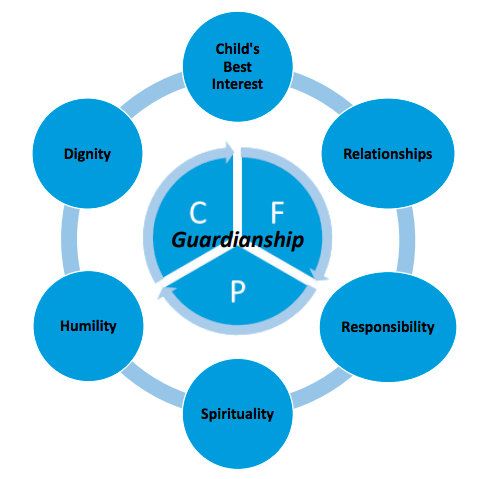Working with Pacific peoples: Va'aifetū
Va'aifetū is a practical guide for integrating Pacific cultures into practice in pursuit of best outcomes for children of Pacific descent.What is Va'aifetū
 Va'aifetū (guardians and guardianship of stars) is the Oranga Tamariki cultural-practice tool that informs practice design, review, and workforce support to best serve the needs of Pacific children and their families.
Va'aifetū (guardians and guardianship of stars) is the Oranga Tamariki cultural-practice tool that informs practice design, review, and workforce support to best serve the needs of Pacific children and their families.
Va'aifetū promotes and emphasises practice that is conducted with:
- cultural humility
- dignity
- emotional intelligence
- diversity of thought
- respect for difference.
Va'aifetū is a Samoan metaphorical term that is derived from the words 'va'ai' which means to take care of, look, see, observe, consider; and 'fetu' which means star or stars.
Va'aifetū is about the guardianship of people — their light, intelligence, wisdom, aspirations, strengths and potential. The stars are the children, families and practitioners.
When to use Va'aifetū
We must use Va'aifetū throughout our practice when working with families of the different Pacific groups.
We must:
- use Va'aifetū alongside existing practice standards and tools
- evidence the application of Va'aifetū in case records.
How to use Va'aifetū
The engagement principles are the overall framework of Va'aifetū. They apply across all Pacific cultures and should be used in conjunction with the practice information for each specific culture.
1 Engagement principles
The engagement principles illustrate the interconnected relationship between child, family and practitioner.

Guardianship
Guardianship is the encompassing principle of the framework.
Guardianship is the unwritten understanding of care of and responsibility for people. This principle is the umbrella under which all notions of alofa/’ofa/aloha/aroha/love, kinship, belonging, identity, responsibility and protection lie. This is the enabling space for recognition, dignity, forgiveness, recovery, reciprocity, resilience, restoration, and shared prosperity.
Child's best interest
- Child: The child’s best interest is the purpose of intervention and the paramount consideration. Pacific children are considered gifts from God. Their wellbeing and prosperity is connected to that of unique Pacific cultures and communities.
- Family: The Pacific child’s interests and sense of belonging are the family’s concern and responsibility. Where interests conflict, those of the child will be paramount.
- Practitioner: Practitioners are expected to act in the best interest of the child at all times.
Dignity
- Child: The child’s dignity will be protected. This includes respect for the child’s selfdefined cultural, gender, sexual, spiritual and social identity.
- Family: Respect for the dignity of Pacific families is essential. This will be demonstrated through the inclusion of cultural and social collectives that are significant to the child, observation of relevant protocols, professionalism, meaningful and nonintimidating engagement.
- Practitioner: The practitioner’s dignity and that of others will be respected.
Humility
- Child: Showing humility to the child elevates her/him, and conveys genuine commitment and respect for her/his voice, dignity and potential.
- Family: Humility is an action associated with integrity and dignity. It is fundamental to meaningful relations with Pacific people and alleviates feelings of disempowerment and resistance. Humility is shown through hospitality, sharing of speaking time, vulnerabilities, personal histories, and status.
- Practitioner: Humility is a skill for those who hold power. It is especially important to show humility towards children who hold the least power or are unaccustomed to it.
Spirituality
- Child: Traditional Pacific cultures believe that a child is a gift from the God and therefore sacred. The child is the bond between families, the connection between the past, the present and what could be. Neglect or violation of this sacredness has spiritual implications for those associated with the child.
- Family: Spiritual beliefs are powerful influences on Pacific peoples’ parenting practices, gender interactions, societal relationships, identity, resilience, motivations, worldviews, and responses to situations. Spirituality includes indigenous beliefs and religions like Christianity, Hindu, and other faiths.
- Practitioner: The value of spirituality in the lives of Pacific children and families is explored, and appropriately incorporated into engagement and the pursuit of outcomes.
Responsibility
- Child: A child’s responsibilities indicate purpose and place within collectives and affiliations. Putting things right with others restores dignity and shows integrity.
- Family: Pacific families believe in their fundamental responsibility for their children. Responsibility is connected to family identity, esteem, dignity, guardianship, duty, accountability, and self-determination.
- Practitioner: Responsibility is enacted according to one’s duty and consciousness. It is also about learning, growing, and exercising courage in the face of conflict.
Relationships
- Child: The Pacific child has a fundamental right to belong with people who will love, protect, defend, and nurture her/him.
- Family: Good relationships are a form of social currency in Pacific families and communities. These provide protection and support in times of difficulty. Traditional kin relationships have associated expectations, and severe consequences when they are violated.
- Practitioner: Relationships are purposeful and child focussed. The best outcomes for vulnerable children are achieved and sustained through collective effort.
2 The specific culture of the child or young person and family
Use the specific guidance for each culture in conjunction with the engagement principles when working with children, young people and families from Pacific cultures.
Culture is inherent, contextual, and ever evolving. Established traditions, values and behavioural nuances particular to any group of people vary over time — these specific ethnic profiles take into account context, mixed ethnicity, and generational differences.
The approaches are most effective when applied using the relevant Pacific language.
Va'aifetū — working with Cook Islands Māori families (PDF 466 KB)
Va'aifetū — working with Fijian and Fijian Indian families (PDF 482 KB)
Va'aifetū — working with I-Kiribati families (PDF 227 KB)
Va'aifetū — working with Niuean families (PDF 473 KB)
Va'aifetū — working with Samoan families (PDF 422 KB)
Va'aifetū — working with Tokelauan families (PDF 301 KB)
Resources
Can't find what you're looking for? Try the search bar or view policies.
